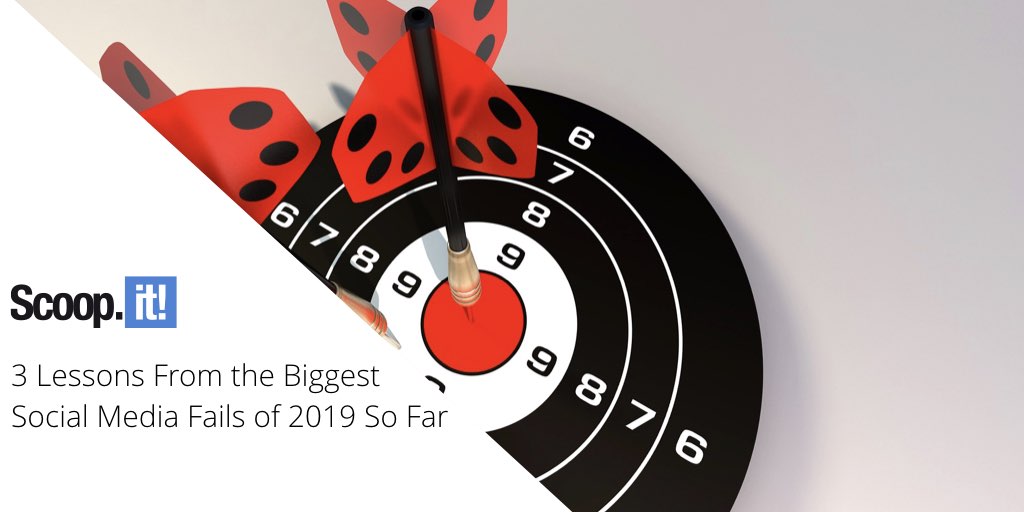
Social media marketing is like home repair: Everyone thinks they’re an expert — until they learn the hard way that they’re not.
Even companies that work with social media personalities all day get it wrong. Mediakix points out that many influencer marketing agencies, which should be master content strategists, are stuck on self-serving and stodgy content. But while around half of users will unfollow brands that post irritating content, the bigger danger is actually poorly thought out content that catches on.
It’s only April, but the first quarter of 2019 has had more than its share of social media snafus. The following three offer valuable lessons for all the “experts” out there:
1. Ryanair’s recommended reading
This past March, British Airways accidentally landed a plane in Edinburgh instead of Düsseldorf. Ryanair, sensing an opportunity to have a little fun, tweeted a picture of a “Geography for Dummies” book at the BA account. The friendly jab should have endeared Ryanair to its audience — but instead, the Twitterverse fired back.
Users quickly began to jeer Ryanair with their own posts. One user suggested Ryanair should read “Customer Service for Dummies.” Another remarked that he would rather take a BA flight to the wrong city than a Ryanair flight to the right one.
The root of Ryanair’s blunder? A misunderstanding, temporarily at least, in how the budget airline’s audience perceives it. As a younger, less established carrier, Ryanair simply didn’t have the clout to come after the posher British Airways.
2. Elon Musk’s unfiltered life
Elon Musk might as well put his face beneath the Tesla and SpaceX logos. His personal brand is tied so closely to the two futuristic companies that his casual tweets inspire droves of articles every week. Brand managers of Tesla and SpaceX must live in a state of constant anxiety wondering what Musk will say next.
Frankly, their fears are justified. In March, the SEC asked a federal judge to hold Musk in contempt of court because he failed to get pre-approval for any of his tweets about Tesla after a judge told him to. Musk didn’t balk, though. Instead, he defended his social media use, calling the SEC’s request a “radical reinterpretation” of the judge’s order.
Tesla’s CEO can argue all he wants, but his tweets have already cost him his title of chairman and $20 million in personal cash. Although his social media accounts have helped Tesla’s brand grow, those same accounts harm the company when Musk fails to use a filter.
Brands (and leaders who may as well be brands) must balance personality and prudence online. Opportunities to join public discourse pass swiftly, so no company can afford to schedule a meeting on Wednesday about a post for Friday. That said, impromptu posts can do major harm in just minutes.
Marketo advises brands to create a social media guidebook to prepare rapid responses. No one can predict the future. But with clear boundaries around what’s acceptable, brands can create engaging content without worrying about crossing the line.
3. Marco Rubio’s naming mix-up
Social media and politics mix like fire and gasoline. The smallest posts often become the biggest stories, and critics find constant opportunities to argue. President Trump’s Twitter account might be the world’s most notorious social media channel, but Marco Rubio recently boosted his own online fame — for the wrong reason.
Last month, Venezuela suffered a serious power outage. Rubio tweeted his criticism, but he botched some important details. His tweet read, “Today another transformer explosion at the German Dam in Bolivar State caused another massive blackout.” Unfortunately for him, Bolívar has no German dam.
What was Rubio referring to? The person who broke the Venezuela story has an unusual name: Germán Dam. Rubio received more than his share of mockery for his mistake — including from the journalist, who personally corrected him.
Politicians, like brands, live in the public eye. Everything they do on social media is open to scrutiny. If they want to be taken seriously, they can’t afford to make rookie mistakes. Brands and social media managers must practice due diligence before tweeting about any event or person trending in the news. Usually, a five-second Google search is enough to debunk a story as fake news or fact-check the names of the people involved.
Brands should take more care on social media, yet many in 2019 will not. By this time next year, hundreds of other companies will find themselves in social media snafus of their own making. It’s old advice, but it’s truer than ever: Pause, think, Google, and then think a little harder before posting.


